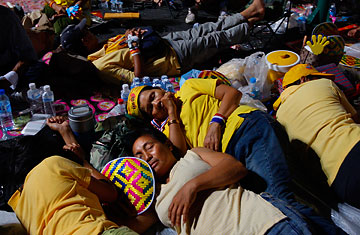
Anti-government protesters sleep on the streets on Aug. 29 in Bangkok, Thailand
Golf clubs aren't the usual accouterments of anti-government protestors, but the demonstrations gripping Bangkok this week haven't exactly been normal. For three days now, thousands of members of the People's Alliance for Democracy (PAD) have occupied Thailand’s halls of power, camping out near the offices of Prime Minister Samak Sundaravej. In the early morning hours of Aug. 29th, protestors — some armed with bamboo poles, others with sporting gear more often associated with the Scottish highlands — managed to evict hundreds of police offers from the grounds of Government House. After celebrating their victory, the demonstrators snoozed on sleeping mats strewn across once-manicured grounds that usually host foreign dignitaries.
Even at the best of times, politics in Thailand rarely hew to the playbook of a mature democracy. But the current situation is quickly reaching that of political farce. Members of the PAD, who have been staging protests in Bangkok for months, are pushing for Samak's resignation and calling for a new, largely appointed parliament to take over governmental duties. The protesters accuse Samak, whose party won a national vote last December, of being nothing more than a proxy for former Prime Minister Thaksin Shinawatra, who was ousted in a bloodless army coup in 2006 and now faces corruption charges. (Earlier in August, Thaksin fled to England, claiming he will not receive a fair trial back home.) Meanwhile, on Aug. 27th, a Thai court issued arrest warrants for nine PAD leaders, charging them with insurrection, a crime that can carry the death penalty. The court orders followed a confrontational move by the group, who besieged a government-run television station. And yet, despite the high stakes, the Government House protests continue with a celebratory air. Friday's pre-dawn successful ejection of police troops from government land, for example, prompted a makeshift party, with protesters shimmying to pop music.
The PAD is led by a motley crew that includes a retired army general, a media mogul and a labor activist. In its previous incarnation back in 2006, the alliance organized anti-Thaksin rallies, which swelled to tens of thousands of people in the months before the military deposed the former Prime Minister in September. Back then, the PAD accused Thaksin of abuse of power and graft, even going so far as to imply that the billionaire tycoon showed disrespect to Thailand's monarch — an incendiary charge in a country where the King is deeply revered. Last December, after a period of military governance, the Thai electorate ushered in Samak, who initially campaigned as the heir to Thaksin's political legacy. (Thaksin's party was dissolved during army rule and he was also banned from politics.) This time around, the PAD's allegations are similar and its leaders are repeating claims that they are taking action to protect Thailand’s monarchy from a dissolute government. But unlike Thaksin, Samak has close connections with the palace. And though the former Bangkok governor made his earlier career as a blustery hard-liner, Samak has so far kept his resolve to use restraint against the PAD protesters occupying his offices.
Despite the party atmosphere and Samak's assurances that security forces will not escalate the situation, there’s still a danger that the siege could turn violent. The Thai military has a dark record of targeting political agitators, most recently in 1992 when its forces massacred unarmed demonstrators in Bangkok. And the specter of another coup perennially hangs over a nation that has suffered multiple military takeovers over the past half-century. As evidence of the prevailing nervous mood, Thailand's benchmark stock index has plummeted nearly 25% since the PAD began its protest movement in May.
On the morning of Aug. 29, just hours after they had been expelled from Government House, riot police armed with shields pushed their way back in. In a tacit acknowledgment that there's no easy solution to this stand-off, Samak, who has rejected the activists' calls to resign, ordered a royal event originally scheduled to take place at Government House the following day to be moved to another venue. Meanwhile, PAD protestors have set up washing lines and police have even trucked in portable toilets in an effort to keep the area clean. The grounds, though, have already been marred by piles of trash and the once-immaculate lawns have been scuffed up. The golf clubs won't be used in their normal line of work any time soon.
